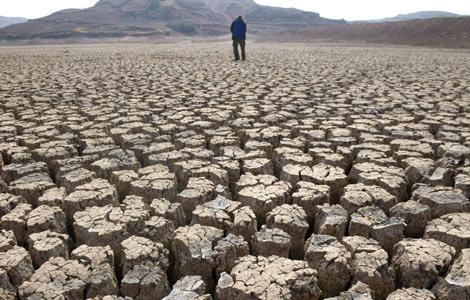 |
|
|
|
|||||||||||
JINAN - Farmer Zhao Yijun in East China's Shandong province frowned when he heard diesel oil prices had been hiked again, a move which will add to his costs for upcoming spring irrigation.
The National Development and Reform Commission (NDRC) increased diesel prices by 600 yuan ($95) per tonne on Tuesday. The hike will raise the cost of diesel oil at retail by 0.51 yuan per liter.
"The expense will further cut my already meager profits," complained Zhao from Qianzhao village of Fengguantun township, Chiping county.
Needing to water his eight mu (0.53 hectares) of wheat eight times per year, he will have to spend 1,500 yuan on irrigation in 2012, 100 yuan more than last year.
Apart from fuel, he will also be hurt by rising fertilizer cost -- the average price of a 40-kg bag has doubled from 80 yuan two years ago to 140 yuan now.
"I barely make 1,000 yuan per mu every year, far less than I would make by finding a job in a city," said the 46 year old, adding his son worked as a town barber, earning 3,000 yuan per month.
"I would not farm again if I had other choices," he said.
Zhao's situation is not unusual in China. Although from 2006, the country's central government has issued a series of documents to restrict taxation of the farming sector, increase farmers' incomes and support construction of agricultural infrastructure, continuous price hikes have greatly affected farmers' incomes and discouraged people from entering or continuing in the profession.
China's grain output hit a record high of 571.21 million tonnes in 2011, marking eight consecutive years of growth.
Luckily for major wheat production provinces like Shandong and Henan, it has been neither too dry nor too cold this winter and farmers are very likely to have another successful harvest in summer 2012.
The crop yield will top 120 million tonnes this summer, 2.5 million tonnes more than a year ago, Minister of Agriculture Han Changfu predicted in early March.
However, rising costs and low profits have affected farmers' willingness to plant crops.
Premier Wen Jiabao said early March in the government work report that China will stabilize crop planting and improve production yields, earmarking 1.2 trillion yuan for agricultural spending. Wen reiterated the importance of farming when he visited Central China's Henan province in late March.
Experts believe the government is aiming to maintain output growth for a ninth consecutive year.
Qin Qingwu of the Chinese Association of Agricultural Economics said, as the world's most populous country, China has to secure its grain production independently.
"As costs have increased, grain prices will further rise," Qin forecasted. He advised the government to offer further subsidies to farmers so as to secure their willingness to farm.
Ma Xiaohe, deputy chief of the Academy of Macro-economic Research with the NDRC, said many farmers, especially the young, had given up farming and become migrant workers in cities, as the income there was much higher.
"If the subsidy is not as high as the rising cost, the country's food security will be challenged in the long run," Ma warned.
The government work report points out that China will continue to raise the minimum average price of wheat and rice by 7.4 yuan and 16 yuan per 50 kg this year. In addition, the premier said subsidies would be given to farmers if fuel prices rise, as fuel has become indispensable for mechanical farming.
The central government has earmarked 132.5 billion yuan for agricultural subsidies of various kind, a strong signal of support for farmers, said Han Changfu at February's national spring farming conference.
Such promises help Zhao Yijun have some belief in the future of his profession. "We farmers don't want to leave farmland abandoned, and I hope we can enjoy greater support from the government," he said.
Wu Ying, iPad, Jeremy Lin, Valentine's Day, Real Name, Whitney Houston, Syria,Iranian issue, Sanyan tourism, Giving birth in Hong Kong, Cadmium spill, housing policy

|

|

|

|

|

|